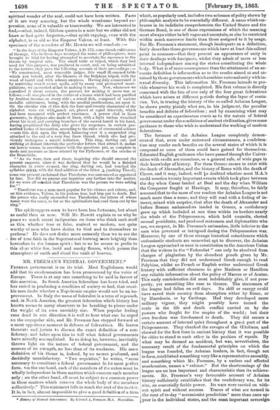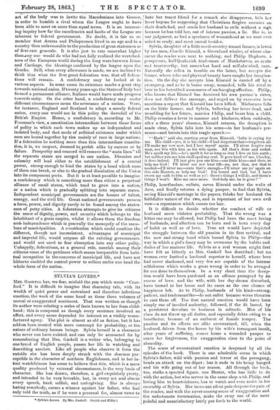MR. FREEMAN'S FEDERAL GOVERNMENT.*
FEDERAL government is on its trial. Most Englishmen would add that its condemnation has been pronounced by the voice of Europe. There is at any rate something to be said in favour of this assertion. In South America federalism has been tried, and has ended in producing a condition of society so bad, that sensi- ble men doubt whether a Napoleonic empire would not be an im- provement. In Italy the name of federalist is a term of reproach, and, in North America, the greatest federation which history has known seems to many observers to be breaking to pieces under the weight of its own unwieldy size. When popular feeling runs dead in one direction it is well to hear what can be urged on the unpopular side, and Mr. Freeman has stepped forward at a most opportune moment in defence of federations. He leaves theorists and jurists to discuss the exact definition of a con- federacy, and takes upon him to tell what federal governments have actually accomplished. In so doing he, however, inevitably throws light on the nature of federal government, and the sources of its strength, no less than of its weakness. His mere definition of his theme is, indeed, by no means profound, and decidedly unsatisfactory. " Two requisites," he writes, " seem necessary to constitute a federal government in its most perfect form. on the one hand, each of the members of the union must be wholly independent in those matters which concern each member only ; on the other hand, all must be subject to a common power in those matters which concern the whole body of the members collectively." This statement fails to reach the root of the matter. It is, in fact, almost impossible to give a good definition of a term
* History of Federal Government. By Edward A. Freeman, M.A. Macmillan.
which, as popularly used, includes two schemes of polity shown by philosophic analysis to be essentially different. A name which em-
braces in its indefinite comprehension the United States and the German Band, is one of those expressions of which the meaning must always either be left vague and uncertain, or else be restricted within much narrower limits than those assigned to it by usage. But Mr. Freeman's statement, though inadequate as a definition, fairly describes those governments which have at least this salient point in common—that they present an appearance of unity in their dealings with foreigners, whilst they admit of more or less internal independence among the states constituting the whole body. What is of more consequence than the attainment of an ac- curate definition is information as to the results aimed at and at- tained by those governments which combine external unity with in- ternal diversity. This information Mr. Freeman intends to Fie- vide whenever his work is completed. His first volume is directly concerned with the fate of one only of the four great federations which have arisen at different periods during the lapse of centu- ries. Yet, in tracing the history of the so-called Achaian League, he shows pretty plainly what are, in his judgment, the peculiar benefits and defects of federalism ; and by examining what may
be considered an experintentum crucis as to the nature of federal government under the conditions of ancient civilization, gives some guidance to those who wish to understand the working of modern federations.
The fortunes of the Achaian League completely demon- strated that, even under untoward circumstances, a confedera- tion may confer such benefits on the several states of which it is composed as none of them could have gained for themselves. Educated English gentlemen who have passed through the Univer- sities with credit are conscious, as a general rule, of wide gaps in their knowledge of history. For them Greece ceases to exist with the death of Alexander, and the history of Rome with the death of Cicero, and it may, indeed, well to doubted whether most M.A.'s could mention twenty important events which took place between the day when Caesar landed at Deal and the day when William the Conqueror fought at Hastings. It may, therefore, be fairly assumed that to the mass of our readers the Achaian League is not much more than a name, and they will read with a feeling of in-
terest, mixed with surprise, that after the death of Alexander and
before Roman ambassadors landed in Greece, a confederacy grew up which included at one time within its borders nearly the whole of the Peleponnesus, which held councils, elected annual presidents, and produced statesmen and diplomatists who are, we suspect, in Mr. Freeman's estimation, little inferior to the men who governed or intrigued dining the Peloponnesian war.
Moreover, by one of those strange historical coincidences which enthusiastic students are somewhat apt to discover, the Achaian League approached so near in constitution to the American Union that the writers in the "Federalist " can only be absolved from charges of plagiarism by the abundant proofs given by Mr.. Freeman that they did not understand Greek enough to read Polybius, whilst no French or English writer understood Greek history with sufficient clearness to give Madison or Hamilton any reliable information about the policy of Marcus or of Aratus. This early confederation did most indubitably give, if not pros- perity, yet something like ease to Greece. The statesmen of the league had fallen on evil days. No skill or energy could have saved their country from absorption either by Rome, or by Macedonia, or by Carthage. Had they developed more military vigour, they might possibly have turned the scale in the life and death conflict carried on by the powers who fought for the empire of the world ; but their own freedom was foredoomed to death. They did secure a certain amount of internal quiet throughout a great part of the Peloponnesus. They checked the ravages of the CEtolians, and showed for the first time in ancient history that it was possible• for cities to stand to each other in the position of equals. By what may be deemed an accident, but was, nevertheless, the necessary result of the fundamental principles on which the
league was founded, the Achaiau leaders, in fact, though not in form, established something very like a representative assembly,
and something which Mr. Freeman, by a useless and affected anachronism, names a " cabinet." But the shortcomings of the league are no less important and characteristic than its achieve- ments. Mr. Freeman's very favourable account of Achaian history sufficiently establishes that the confederacy was, for its size, an essentially feeble power. Its wars were carried on with-
out spirit and without success. Traces of what are termed in the cant of to-day " secessionist proclivities" more than once ap- pear in the individual states, and the most important sovereign act of the body was to invite the Macedonians into Greece, in order to humble a rival whom the League ought to have been able to meet on more than equal terms. It is an interest- ing inquiry how far the excellencies and faults of the League are inherent to federal government. No doubt, it is fair to re- member that Aratus and Philopoemen lived in an age and in a country then unfavourable to the production of great statesmen or of first-rate generals. It is also just to rate somewhat higher than .any one would do who had not fully realized the wretched- ness of the European world during the long wars between Rome and Carthage, the blessings conferred by the league upon the Greeks. Still, when every allowance is made, we are inclined to think that what the first great federation was, that all federa- tions will remain. A confederacy may be looked at in various aspects. In some cases its existence marks a great step towards national union. If twenty years ago the States of Italy had formed a permanent alliance, Italians would have made progress towards unity. On the other hand, a confederacy may under different circumstances mean the severance of a nation. Were, for instance, England and Scotland to adopt a merely federal union, every one would see in this policy the downfall of the British Empire. Hence, a confederacy is, according to Mr. Freeman's view, a constitution intermediate between these forms of polity in which each town makes up an independent and isolated body, and that mode of political existence under which men are bound together by ties mainly of race in large nations. If a federation be nothing more than this intermediate constitu- tion, it is, we suspect, doomed to perish alike by success or by failure. Prosperity and concord will remove the " state lines" till the separate states are merged in one nation. Disunion and calamity will lead either to the establishment of a central power, strong enough to bind the states by a bond which none of them can break, or else to the gradual dissolution of the Union into its component parts. But it is at least possible to imagine a confederacy which is something more than either a perpetual alliance a small states, which tend to grow into a nation, or a nation which is gradually splitting into separate states. Independent municipal governments are the homes of talent, energy, and the civil life. Great national governments possess a force, power, and dignity rarely to be found among the states- men of petty cities. A federation attempts to give its citizens the sense of dignity, power, and security which belongs to the inhabitant of a great empire, whilst it allows them the freedom and. independence which is generally the monopoly of the mem- bers of municipalities. A constitution which could combine the different, though not inconsistent, advantages of municipal and imperial life, would surpass all the existing governments. and would not need to fear absorption into any other polity. Unhappily, federations, as a general rule, nourish among their citizens some of the pettiness which seems inseparable from habi- tual occupation in the concerns of municipal life, and have not hitherto enabled the central power to collect under one head the whole force of the nation.































 Previous page
Previous page